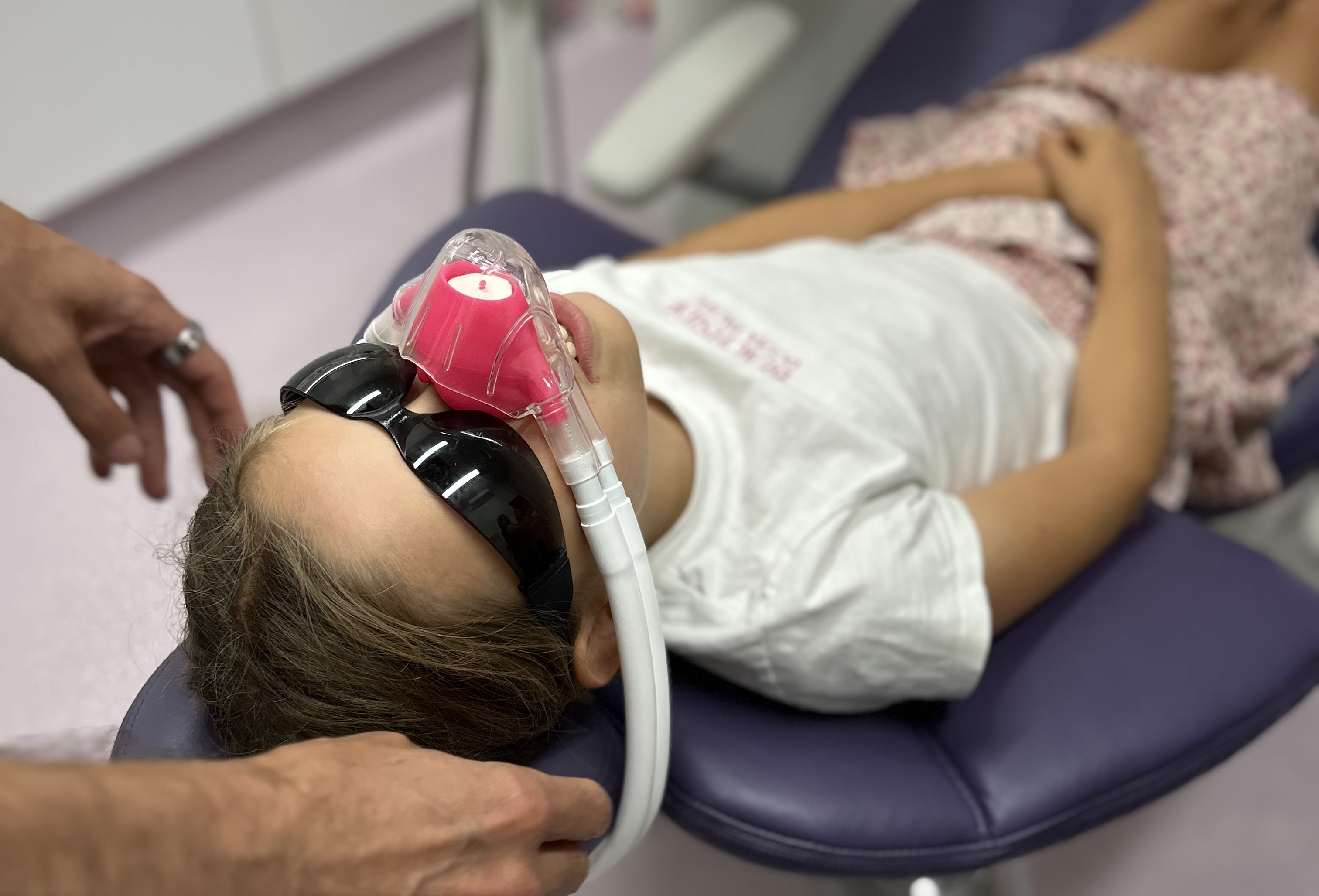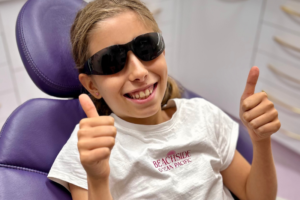Gentle Inhalation Sedation for Nervous Children in London
Expert Paediatric Dental Care at Optimal Dental Health Baker Street
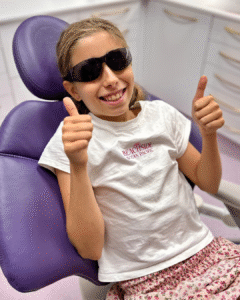
Many parents seek safe ways to help nervous children through dental visits. Gentle inhalation sedation, using nitrous oxide (laughing gas), is a widely used option that calms anxiety while keeping children awake and responsive. This approach is crucial for creating positive early dental experiences, fostering good oral hygiene habits, and preventing dental phobias. This article explains how inhalation sedation works for kids, its safety, benefits, and practical preparation tips for a smoother appointment. It also highlights Dr Sara Johnstone’s expertise at Optimal Dental Health in Baker Street, a specialist paediatric sedation dentist, ensuring parents find accurate, local information to make informed decisions for their child’s dental care.
What Is Inhalation Sedation for Children’s Dental Treatment?
Inhalation sedation for children is a form of conscious sedation using a nitrous oxide and oxygen mixture delivered through a small nasal mask. The child remains awake and responsive but enters a deeply relaxed state, aware of their surroundings but less bothered. Nitrous oxide gently lowers sensory reactivity, creating a calm, conscious state that helps children tolerate dental procedures.
This results in improved cooperation and rapid recovery, making it suitable for routine paediatric dental work. Parents receive clear communication about suitability and monitoring protocols before any sedation is offered.
Component | Function | Role in Procedure |
|---|---|---|
| Nitrous oxide + oxygen mixture | Sedative gas blend | Produces mild anxiolysis while allowing consciousness |
| Child-sized nasal mask | Delivery interface | Ensures comfortable and targeted gas administration |
| Gas delivery unit with flow control | Regulates concentrations | Allows clinician to titrate dose for effect |
| Monitoring equipment (pulse oximeter) | Tracks vital signs | Confirms oxygenation and patient safety |
How Does Laughing Gas Work for Kids?
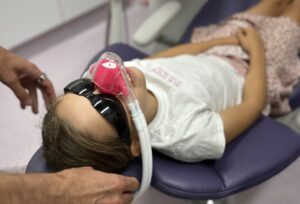
Laughing gas (nitrous oxide) works for children by creating a mild central nervous system depressant effect that reduces anxiety, eases discomfort, and blunts the emotional response to dental stimuli while maintaining protective reflexes. It interacts with neurotransmitters in the brain, particularly GABA receptors, to produce a calming effect without causing deep unconsciousness.
This allows the child to remain responsive, communicate, and maintain natural breathing and gag reflexes. The gas mixture takes effect within minutes, producing relaxation. Recovery is rapid as nitrous oxide is eliminated quickly through the lungs, allowing the child to return to normal activities shortly after. Nitrous oxide has a strong safety profile for routine paediatric dental procedures.
Nitrous Oxide Sedation for Anxious Pediatric Dental Patients: Safety and Efficacy
Nitrous oxide-oxygen inhalation sedation for dental procedures in pediatric dentistry is a safe modality for patients experiencing dental anxiety. These interventions can facilitate the delivery of appropriate dental care to uncooperative children, thereby enhancing their quality of life.
Evaluation of dental treatments under nitrous oxide-oxygen inhalation sedation in pediatric patients with dental anxiety: a 10-Year retrospective study, B Ghabchi, 2025. This research underscores the established safety and effectiveness of nitrous oxide, providing reassurance for parents considering this option.
What Makes Inhalation Sedation Safe for Children?
Safety for inhalation sedation relies on clinician training, appropriate patient selection, and continuous monitoring with calibrated equipment. Specialist paediatric dentists and trained staff undergo rigorous training, including advanced life support and specific paediatric sedation courses. They use devices like pulse oximeters to monitor oxygen saturation, heart rate, and respiration rate, maintaining vigilant clinical observation. Patient selection involves a thorough review of medical history and a behavioural assessment to identify any contraindications. The rapid onset and clearance of nitrous oxide are fundamental safety advantages, as effects wear off quickly.
What Are the Benefits of Inhalation Sedation for Nervous Children?

Inhalation sedation offers several direct benefits for nervous children by reducing fear, promoting relaxation, and enabling clinicians to complete necessary dental treatment with fewer interruptions. The mild anxiolysis and sensory dampening from the nitrous oxide and oxygen mixture lead to calmer behavior, enhanced tolerance for dental instruments, and a quicker, more positive appointment experience.
| Benefit | Mechanism | Expected Outcome |
|---|---|---|
| Anxiety reduction | Mild anxiolysis from nitrous oxide | Calmer child, less distress during procedures, preventing the “fight or flight” response. |
| Improved cooperation | Reduced sympathetic arousal | Fewer interruptions, ability to complete treatment efficiently, leading to better quality care. |
| Reduced gag reflex | Lowered sensory reactivity | Easier instrumentation and more comfortable care, especially for children with sensitive reflexes. |
| Positive memory formation | Less traumatic experience | Greater likelihood of regular future attendance, building trust and reducing future avoidance. |
Why Choose Dr Sara Johnstone for Paediatric Dentistry in Baker Street?
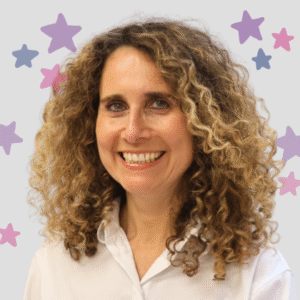
Dr Sara Johnstone is a specialist paediatric dentist who provides holistic, child-centred care and gentle inhalation sedation for nervous children at Optimal Dental Health in Baker Street. Her specialist training ensures she can assess suitability for sedation and apply effective behaviour management techniques alongside pharmacological options. This dual expertise prioritises the child’s comfort and safety, aiming to complete necessary treatment efficiently with a calm, stepwise approach. For local families seeking a paediatric sedation dentist Baker Street, Sara Johnstone dentist, combination of specialist practice and gentle chairside manner offers reassurance and a positive child experience.
If you would like to discuss inhalation sedation for your child, ask about arranging a consultation with Dr Sara Johnstone at Optimal Dental Health in Baker Street; the practice team can explain suitability and the typical patient pathway.
What Are Dr Johnstone’s Specialist Qualifications and Experience?
Dr Sara Johnstone is a specialist paediatric dentist with extensive experience caring for nervous children and administering gentle inhalation sedation. Her specialist focus includes advanced clinical skills in paediatric dentistry and deep expertise in behaviour management strategies. This rigorous training ensures she can handle a wide range of paediatric dental needs, from routine check-ups to complex restorative procedures, always prioritising the child’s emotional well-being. Her role integrates sedation safely within a broader, holistic care plan.
How Does Dr Johnstone’s Gentle Approach Benefit Nervous Children?
Dr Johnstone’s gentle approach combines child-centred communication, stepwise desensitisation, and selective use of inhalation sedation to reduce distress and foster cooperation. Techniques include age-appropriate explanation (e.g., “sleepy air”), distraction (e.g., engaging stories), and positive reinforcement, alongside minimal sedation, to make procedures tolerable and memorable in a positive way. She employs the “tell-show-do” technique, building trust and reducing fear of the unknown. Using sedation as an adjunct helps many children build confidence and eventually accept routine dental care.
What Do Parents Say About Dr Johnstone’s Care?
Parent feedback is valuable for understanding real-world outcomes. Many parents describe profound relief at seeing their child calm and even smiling during treatment, often noting how previous dental visits were fraught with tears and anxiety. They frequently express appreciation for Dr Johnstone’s clear explanations, gentle handling, and the way she patiently builds rapport with their children. Other common remarks emphasise improved willingness to attend future appointments and a newfound trust in the clinician’s judgement about sedation, often stating that their child now looks forward to dental visits. These anecdotal impressions reflect the broader goal of creating positive dental experiences for nervous children.
Nitrous Oxide-Oxygen Sedation: An Effective Modality for Pediatric Dental Anxiety
For patients exceeding 7 years of age, inhaled nitrous oxide-oxygen sedation (NOIS) is recognized as a highly effective and well-established pharmacological strategy for mitigating anxiety and pain during dental procedures. Efficacy of virtual reality hypnosis versus conscious sedation with nitrous oxide in the management of dental anxiety in pediatric dentistry: protocol for a prospective 2025.
How Does Optimal Dental Health Provide a Calming Experience for Anxious Kids?
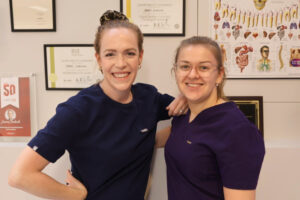
Optimal Dental Health emphasises a holistic, child-friendly environment that combines trained staff, calming clinical spaces, and a structured patient journey to reduce anxiety and support children through treatment.
The clinic’s approach integrates behavioural preparation, selective inhalation sedation, and preventive strategies to minimise the need for repeat invasive procedures. Calming decor, appropriate lighting, and staff training in paediatric behaviour management help children feel understood and safe. Local convenience in Baker Street supports families by reducing travel stress and fitting appointments into daily routines more easily.
| Clinic Feature | Parent Concern Addressed | Impact on Child Experience |
|---|---|---|
| Calming decor and child-sized equipment | Fear of unfamiliar environment | Reduced initial distress and quicker acclimatisation, making the clinic feel less intimidating. |
| Trained paediatric staff | Worry about safety and competence | Confident handling and predictable treatment flow, building trust and reassurance. |
| Structured patient journey | Uncertainty about process | Clear expectations reduce parental and child anxiety, fostering a sense of control. |
| Baker Street location | Travel and scheduling stress | Easier logistics support attendance and follow-up, reducing pre-appointment tension. |
What Is the Patient Journey for Children Receiving Sedation?
The patient journey for inhalation sedation typically follows a stepwise flow: initial consultation and medical suitability assessment, informed consent and pre-appointment guidance, the sedation appointment with monitoring and supportive behaviour management, and a short monitored recovery before discharge with follow-up instructions. Each step is designed to set expectations and reduce surprises, ensuring comfort and safety. Recovery is brief, and clinicians provide guidance on resuming normal activity.
- Initial consultation and suitability assessment, including a thorough medical history review.
- Pre-appointment instructions and detailed consent discussion with parents.
- Sedation appointment with continuous monitoring and tailored behaviour support.
- Short recovery period under observation, followed by post-care instructions and follow-up planning.
How Does the Baker Street Location Enhance Accessibility and Comfort?
Baker Street as a central London location offers practical advantages that reduce time and logistical stress for families. Its excellent public transport links make it easily accessible from across London. Shorter travel times and straightforward routing to the clinic can mean less pre-appointment anxiety for both parents and children, making it easier to keep scheduled visits.
Comfortable waiting areas and proximity to local landmarks can also help families incorporate appointments into school and work routines without excessive disruption. For parents seeking a child friendly dentist Baker Street, these local conveniences support a smoother overall experience.
What Holistic Treatments Complement Inhalation Sedation?
Inhalation sedation is most effective when combined with non-pharmacological strategies and preventive treatments. Complementary approaches include behavioural desensitisation, parental coaching for home dental routines, and preventive dentistry like topical fluoride and fissure sealants to lower cavity risk.
These elements form a holistic care package that aims to limit invasive procedures over time and foster resilience in children facing dental anxiety, blending sedation with preventive and behavioural measures.
How Can Parents Prepare Their Child for Inhalation Sedation at the Dentist?
Preparation helps reduce anxiety before a sedation appointment. Key steps include explaining the visit in calm, age-appropriate language, using simple terms like “sleepy air.” Following pre-appointment guidance on food or medication is vital. Bringing comforting items, such as a favourite toy or blanket, can provide familiarity. Parents should also prepare questions in advance. Clear preparation reduces uncertainty and helps the child approach the appointment with trust.
- Use calm, neutral language to describe the dentist and the procedure, focusing on positive aspects.
- Practice short role-play visits at home to familiarise the child with the clinic routine.
- Bring a favourite comfort item and plan for a relaxed recovery period at home.
What Should Parents Expect During the First Sedation Appointment?
During the first sedation appointment, parents can expect an initial review of medical history, a clear consent conversation, gentle acclimatisation to the nasal mask, monitored delivery of the nitrous oxide/oxygen mix, and a short recovery phase. Clinicians explain monitoring equipment and verbal cues to gauge the child’s comfort. After the appointment, parents receive guidance on post-appointment care and when to resume normal activities, usually within a short period due to the rapid clearance of nitrous oxide.
How Can Parents Help Reduce Their Child’s Dental Anxiety at Home?
Parents can use evidence-informed techniques to reduce dental anxiety at home, such as role-play sessions that simulate going to the dentist. Reading age-appropriate books about dental visits helps normalise the experience, and modelling calm behaviour prevents heightening fear. Positive reinforcement for cooperative behaviour during home oral hygiene builds confidence. Consistent, calm parental attitudes and rehearsal of simple procedures support the clinician’s efforts during the appointment.
What Are Common Questions Parents Ask About Laughing Gas for Kids?
Typical questions include whether nitrous oxide is safe, whether the child will remember the appointment, and what transient side effects might occur. Short, clear answers reassure most parents: nitrous oxide has a strong safety record; many children have limited or blurred recall; and minor, short-lived effects such as nausea are uncommon but discussed during consent.
- Is inhalation sedation safe for children? Yes, when used by trained specialists with continuous monitoring and appropriate patient selection.
- Will my child remember the procedure? Many children have little or vague memory of the experience, often recalling only pleasant sensations.
- Are there side effects? Side effects are uncommon and typically short-lived (e.g., mild nausea); clinicians will review all potential risks during consent.
- How long does the effect last? The effects wear off within minutes of stopping the gas, allowing for a quick return to normal activity.
- Can my child eat before the appointment? Specific pre-appointment dietary instructions will be provided, usually advising a light meal a few hours beforehand.
How to Book a Consultation with Dr Sara Johnstone at Optimal Dental Health, Baker Street
To book a consultation for paediatric inhalation sedation, parents should contact Optimal Dental Health to arrange an initial suitability assessment and discuss the child’s medical history and behaviour. The typical scheduling pathway starts with an assessment appointment to confirm suitability and consent, followed by a planned sedation appointment if appropriate.
For families seeking a paediatric sedation dentist in Baker Street, requesting a consultation with specialist Dr Sara Johnstone is the first step toward a calm, managed treatment plan. Our team is ready to guide you through the process.
Book Your Child’s Consultation Today
What Are the Clinic’s Contact Details and Opening Hours?
Optimal Dental Health’s Baker Street address is 1 Melcombe Street, London NW1 6AE and our phone number is 0203 921 1000
How to Schedule an Appointment for Paediatric Inhalation Sedation?
Scheduling typically involves an initial consultation to assess suitability, a consent discussion, and an arranged sedation appointment when appropriate. Our team is adept at guiding parents through this process, ensuring all necessary information is collected. Follow-up appointments and preventive care scheduling are discussed before discharge to maintain continuity of care.
What Should Parents Bring to the First Visit?
A simple checklist ensures the first visit goes smoothly: bring any relevant medical history or medication lists, identification where required, previous dental records if available, and a favourite comfort item for the child. The medical history helps Dr Johnstone understand your child’s overall health. Parents should also prepare questions about sedation and monitoring. Finally, allow time for a calm arrival and a brief period of acclimatisation in the waiting area, helping your child settle in before their appointment.
- Medical history and a comprehensive list of current medications.
- Identification for the parent/guardian and any previous dental records if available.
- Child’s favourite comfort item (e.g., a small toy, blanket) and a list of prepared questions for the clinician.
